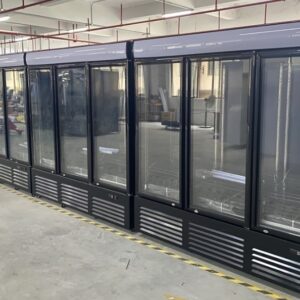Energy-Efficient Refrigeration Systems for Supermarkets: In today’s competitive retail landscape, supermarkets face the dual challenge of providing high-quality products while also managing operational costs. Among the significant expenditures for supermarkets, energy consumption stands out, particularly when it comes to refrigeration systems. Supermarkets rely heavily on refrigeration to maintain the freshness of perishable goods, but traditional systems can lead to soaring energy bills and a substantial carbon footprint. Fortunately, energy-efficient refrigeration systems are revolutionizing how supermarkets operate, offering both financial and environmental benefits. In this blog, we will explore the advantages of energy-efficient refrigeration systems, the latest technologies, and how supermarkets can implement these solutions effectively.
1. Understanding Energy-Efficient Refrigeration
Energy-efficient supermarket refrigeration equipment is designed to reduce energy consumption while maintaining optimal performance and product quality. These systems utilize advanced technologies and innovative designs to minimize energy usage, decrease greenhouse gas emissions, and lower operating costs.
By adopting energy-efficient practices, supermarkets can:
- Reduce Energy Costs: Energy-efficient refrigeration systems consume less power, translating to lower energy bills. According to the U.S. Department of Energy, upgrading to energy-efficient systems can result in savings of up to 30% in energy costs.
- Enhance Product Freshness: These systems are engineered to maintain consistent temperatures, ensuring that perishable goods remain fresh for longer periods. This reduces spoilage and waste, further enhancing the supermarket’s bottom line.
- Minimize Environmental Impact: By lowering energy consumption and greenhouse gas emissions, supermarkets can contribute to a more sustainable future. Energy-efficient refrigeration systems often utilize refrigerants with lower global warming potential (GWP), reducing their environmental footprint.
2. Technological Innovations in Refrigeration
Several technological advancements have emerged in the refrigeration industry, making energy-efficient systems more accessible and effective for supermarkets. Some of the key innovations include:
- Variable Speed Compressors: Traditional refrigeration systems often operate at fixed speeds, resulting in inefficient energy use. Variable speed compressors, however, adjust their speed based on the cooling demand, consuming less energy when full cooling power is unnecessary. This technology leads to significant energy savings and improved system reliability.
- Intelligent Controls and Monitoring: Advanced control systems allow supermarkets to monitor and manage their refrigeration units more effectively. Smart sensors can detect temperature fluctuations and adjust cooling levels accordingly, ensuring optimal performance and energy efficiency. Remote monitoring systems enable store managers to track energy consumption in real time and make adjustments to reduce waste.
- Eco-Friendly Refrigerants: Many energy-efficient refrigeration systems now use eco-friendly refrigerants with low GWP. Hydrofluoroolefins (HFOs) and natural refrigerants like carbon dioxide (CO2) and ammonia are gaining popularity due to their lower environmental impact. Transitioning to these refrigerants can significantly reduce a supermarket’s carbon footprint.
- LED Lighting: Integrating LED lighting into refrigerated displays can enhance visibility while consuming less energy than traditional lighting options. LED lights generate less heat, which helps maintain cooler temperatures inside refrigeration units and reduces the workload on cooling systems.
3. Implementing Energy-Efficient Refrigeration Solutions
Supermarkets looking to upgrade their refrigeration systems can follow these steps to implement energy-efficient solutions effectively:
- Conduct an Energy Audit: Begin by assessing your current refrigeration systems to identify inefficiencies and areas for improvement. An energy audit can provide valuable insights into energy consumption patterns and highlight opportunities for upgrades.
- Invest in Upgraded Systems: Once you’ve identified areas for improvement, consider investing in energy-efficient refrigeration units. Look for systems that have the Energy Star label, as these products meet strict energy efficiency guidelines set by the U.S. Environmental Protection Agency (EPA).
- Optimize Layout and Design: The layout and design of your refrigeration units can significantly impact energy efficiency. Ensure that refrigerated displays are strategically placed to minimize heat gain from ambient temperatures. Proper airflow around the units is also essential for efficient operation.
- Regular Maintenance and Servicing: To ensure optimal performance and energy efficiency, schedule regular maintenance for your refrigeration systems. This includes cleaning coils, checking refrigerant levels, and inspecting seals and gaskets to prevent air leaks.
- Educate Staff on Best Practices: Training staff on energy-efficient practices can contribute to overall energy savings. Simple measures, such as ensuring doors to refrigerated units are closed promptly and minimizing the time doors are open, can have a substantial impact on energy consumption.
4. The Financial Benefits of Energy Efficiency
While the initial investment in energy-efficient refrigeration systems may seem high, the long-term financial benefits are significant. The reduction in energy costs can lead to substantial savings over time, allowing supermarkets to allocate resources to other critical areas of their business. Additionally, many governments and utility companies offer incentives and rebates for upgrading to energy-efficient systems, further offsetting initial costs.
Moreover, adopting sustainable practices can enhance a supermarket’s brand image and attract environmentally conscious consumers. Today’s shoppers are increasingly looking for businesses that prioritize sustainability, and energy-efficient refrigeration systems can help supermarkets position themselves as responsible retailers.
5. Conclusion
Energy-efficient refrigeration systems are not just a trend; they represent a vital investment in the future of supermarket operations. By reducing energy consumption, enhancing product freshness, and minimizing environmental impact, these systems offer a win-win solution for both supermarkets and their customers. As technology continues to advance, the potential for energy savings and sustainability will only grow. Supermarkets that embrace energy-efficient refrigeration solutions today will not only save money but also contribute to a greener and more sustainable future.
In conclusion, the journey towards energy efficiency begins with informed decisions and proactive measures. By investing in energy-efficient refrigeration systems, supermarkets can secure a competitive edge, boost profitability, and demonstrate their commitment to sustainability in an increasingly eco-conscious market.

